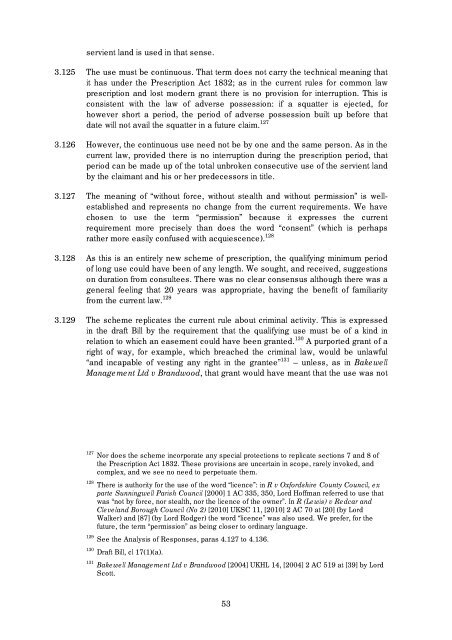Making Land Work: Easements, Covenants and ... - Law Commission
Making Land Work: Easements, Covenants and ... - Law Commission
Making Land Work: Easements, Covenants and ... - Law Commission
Create successful ePaper yourself
Turn your PDF publications into a flip-book with our unique Google optimized e-Paper software.
servient l<strong>and</strong> is used in that sense.<br />
3.125 The use must be continuous. That term does not carry the technical meaning that<br />
it has under the Prescription Act 1832; as in the current rules for common law<br />
prescription <strong>and</strong> lost modern grant there is no provision for interruption. This is<br />
consistent with the law of adverse possession: if a squatter is ejected, for<br />
however short a period, the period of adverse possession built up before that<br />
date will not avail the squatter in a future claim. 127<br />
3.126 However, the continuous use need not be by one <strong>and</strong> the same person. As in the<br />
current law, provided there is no interruption during the prescription period, that<br />
period can be made up of the total unbroken consecutive use of the servient l<strong>and</strong><br />
by the claimant <strong>and</strong> his or her predecessors in title.<br />
3.127 The meaning of “without force, without stealth <strong>and</strong> without permission” is wellestablished<br />
<strong>and</strong> represents no change from the current requirements. We have<br />
chosen to use the term “permission” because it expresses the current<br />
requirement more precisely than does the word “consent” (which is perhaps<br />
rather more easily confused with acquiescence). 128<br />
3.128 As this is an entirely new scheme of prescription, the qualifying minimum period<br />
of long use could have been of any length. We sought, <strong>and</strong> received, suggestions<br />
on duration from consultees. There was no clear consensus although there was a<br />
general feeling that 20 years was appropriate, having the benefit of familiarity<br />
from the current law. 129<br />
3.129 The scheme replicates the current rule about criminal activity. This is expressed<br />
in the draft Bill by the requirement that the qualifying use must be of a kind in<br />
relation to which an easement could have been granted. 130 A purported grant of a<br />
right of way, for example, which breached the criminal law, would be unlawful<br />
“<strong>and</strong> incapable of vesting any right in the grantee” 131 – unless, as in Bakewell<br />
Management Ltd v Br<strong>and</strong>wood, that grant would have meant that the use was not<br />
127 Nor does the scheme incorporate any special protections to replicate sections 7 <strong>and</strong> 8 of<br />
the Prescription Act 1832. These provisions are uncertain in scope, rarely invoked, <strong>and</strong><br />
complex, <strong>and</strong> we see no need to perpetuate them.<br />
128 There is authority for the use of the word “licence”: in R v Oxfordshire County Council, ex<br />
parte Sunningwell Parish Council [2000] 1 AC 335, 350, Lord Hoffman referred to use that<br />
was “not by force, nor stealth, nor the licence of the owner”. In R (Lewis) v Redcar <strong>and</strong><br />
Clevel<strong>and</strong> Borough Council (No 2) [2010] UKSC 11, [2010] 2 AC 70 at [20] (by Lord<br />
Walker) <strong>and</strong> [87] (by Lord Rodger) the word “licence” was also used. We prefer, for the<br />
future, the term “permission” as being closer to ordinary language.<br />
129 See the Analysis of Responses, paras 4.127 to 4.136.<br />
130 Draft Bill, cl 17(1)(a).<br />
131<br />
Bakewell Management Ltd v Br<strong>and</strong>wood [2004] UKHL 14, [2004] 2 AC 519 at [39] by Lord<br />
Scott.<br />
53
















